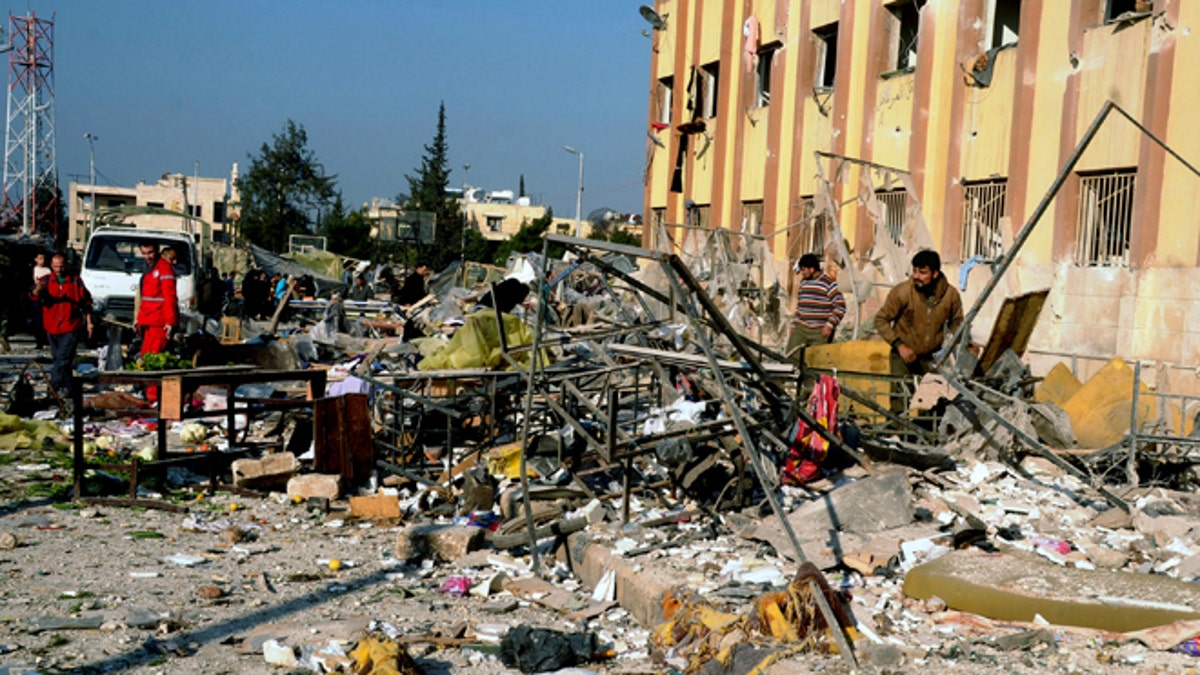
Jan. 15, 2013: In this photo released by the Syrian official news agency SANA, Syrian people gather at the site after an explosion hit a university in Aleppo, Syria. (AP/SANA)
A triple car bombing killed at least 22 people in northern Syria on Wednesday, a government official and activists said, a day after massive explosions at a university campus in Syria's largest city left 87 dead, with the death toll possibly rising.
It was not immediately clear what the target of the three almost simultaneous car bombs in the city of Idlib was.
The Britain-based Syrian Observatory for Human Rights said the bombings targeted security vehicles near the local security headquarters and a checkpoint. At least 24 people were killed, most of them regime forces, it said.
However, a government official said the blasts hit a major highway and a roundabout in Idlib, killing 22 people and wounding 35. The official, who spoke to The Associated Press on condition of anonymity because he was not authorized to brief the media, did not say what the target was.
Rebels control vast areas of the Idlib countryside, but the city itself is controlled by the regime.
The bombings in Idlib come on the heels of the twin blasts a day earlier that ripped through the Aleppo University campus, which anti-regime activists said killed 87 people.
The Observatory said the death toll could rise even further because medics have collected unidentified body parts and some of the more than 150 wounded are in critical condition.
The blasts occurred while students were taking their midterm exams, Syria's UN envoy told the UN Security Council, according to The Guardian.
Syria's Ministry of Higher Education suspended classes and exams at all Syrian universities on Wednesday, "in mourning for the souls of the heroic martyrs who were assassinated by the treacherous terrorist hand," the state news service reported.
The SANA report quoted the minister of higher education, Mahmoud Mualla, as saying that Assad had ordered the reconstruction of Aleppo University "with the utmost speed."
But at the same time, Syrian government forces reportedly launched another offensive in Aleppo Wednesday, killing dozens of "terrorists," which is the name the Assad regime uses to describe rebel forces.
"The Armed Forces carried out several special operations against the mercenary terrorists in Aleppo and its countryside, inflicting heavy losses upon them in several areas," SANA said, according to Reuters.
The opposition and the government have blamed each other for the university blasts, which marked a major escalation in the struggle for control of Aleppo -- once the country's main commercial hub.
It remains unclear what caused the blasts, setting cars alight and blowing the walls off dormitory rooms. Amateur video footage taken after the attack showed students walking out of the university with books in their arms.
Activists said forces loyal to President Bashar Assad launched two airstrikes on the area at the time of the blasts, while Syrian state media said a "terrorist group" hit it with two rockets.
The scale of destruction appeared inconsistent with the rockets the rebels are known to possess.
The competing narratives about what caused the blasts highlighted the difficulty of confirming reports from inside Syria.
The Syrian government bars most media from working in the country, making independent confirmation of events difficult. Both anti-regime activists and the government sift the information they give to journalists to boost their cause. And civilians stuck in the middle avoid talking to the media, fearing reprisals from both sides for speaking their minds.
Aleppo has been the focus of a violent struggle for control since rebel forces, mostly from rural areas north of the city, pushed in and began clashing with government troops last summer.
The university is in the city's west, a sector still controlled by the government. Both activists and the Assad regime said those killed in Tuesday's blasts were mostly students taking their mid-year exams and civilians who sought refuge in the university dorms after fleeing violence elsewhere.
On Tuesday, Syria's U.N. Ambassador Bashar Ja'afari told a Security Council meeting on combatting terrorism that "a cowardly terrorist act targeted the students of Aleppo University" as they sat for their mid-terms. He said 82 students were killed and 152 were wounded.
Syria's crisis began with political protests in March 2011 but quickly descended into a full-blown civil war, with scores of rebel groups across the country fighting Assad's forces. The U.N. said this month that more than 60,000 people have been killed in the violence.
The Associated Press contributed to this report.
